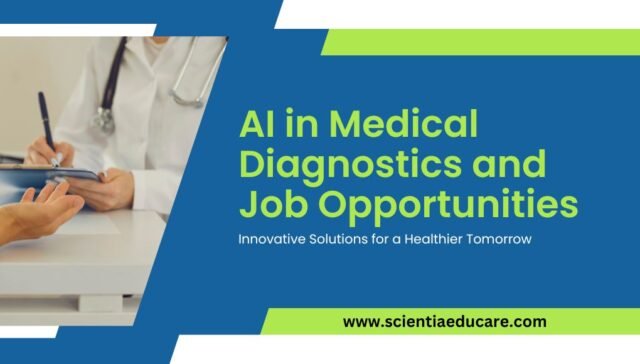Artificial Intelligence (AI) is revolutionizing the field of medical diagnostics, offering unprecedented accuracy and efficiency in disease detection and patient care. This transformation is not only enhancing healthcare outcomes but also creating a plethora of job opportunities worldwide. This article delves into the rise of AI in medical diagnostics, explores various career prospects, and highlights top educational institutions offering relevant courses.
The Rise of AI in Medical Diagnostics,
AI-driven medical imaging,
Machine learning in diagnostics,
AI healthcare job market,
Future of AI in medicine,
Career growth in AI healthcare
The Emergence of AI in Medical Diagnostics
AI’s integration into medical diagnostics has led to significant advancements in how diseases are detected and managed. Machine learning algorithms analyze vast datasets, including medical images, electronic health records, and genomic information, to identify patterns indicative of specific health conditions. This capability allows for earlier detection, personalized treatment plans, and improved patient outcomes.
Key Applications of AI in Diagnostics
-
Medical Imaging Analysis: AI algorithms assist radiologists by enhancing the interpretation of imaging studies, leading to more accurate diagnoses.
-
Pathology: AI aids pathologists in analyzing tissue samples, improving the accuracy and speed of disease identification.
-
Genomics: AI facilitates the analysis of genomic data, enabling personalized medicine approaches.
-
Predictive Analytics: AI models predict disease progression and patient outcomes, assisting clinicians in decision-making.
Career Opportunities in AI-Driven Medical Diagnostics
The fusion of AI and healthcare has opened numerous career paths for professionals with diverse skill sets. Below are some prominent roles in this burgeoning field:
1. Health Data Analyst
Health Data Analysts collect, process, and analyze healthcare data to extract meaningful insights. They work with large datasets, including electronic health records and medical imaging data, to support clinical decision-making and improve patient care.
Key Responsibilities:
-
Collect and manage healthcare data from various sources.
-
Analyze data to identify trends and patterns.
-
Collaborate with healthcare professionals to interpret data findings.
Relevant Job Listings:
2. Medical Data Scientist
Medical Data Scientists develop algorithms and models to analyze complex medical data. They play a crucial role in creating AI tools that assist in diagnostics and treatment planning.
Key Responsibilities:
-
Develop and validate predictive models for disease detection.
-
Collaborate with clinicians to integrate AI tools into practice.
-
Stay updated with advancements in AI and healthcare.
Relevant Job Listings:
3. AI Engineer in Medical Imaging
AI Engineers in Medical Imaging design and implement AI algorithms to enhance the analysis of medical images. Their work improves the accuracy and efficiency of imaging diagnostics.
Key Responsibilities:
-
Develop machine learning models for image analysis.
-
Optimize algorithms for real-time diagnostic applications.
-
Collaborate with radiologists to validate AI tools.
Relevant Job Listings:
4. Clinical AI Researcher
Clinical AI Researchers conduct studies to develop and assess AI applications in clinical settings. They aim to improve diagnostic processes and patient outcomes through innovative AI solutions.
Key Responsibilities:
-
Design and conduct research studies on AI in healthcare.
-
Publish findings in scientific journals.
-
Collaborate with interdisciplinary teams to implement research outcomes.
Relevant Job Listings:
5. AI Product Manager in Healthcare
AI Product Managers oversee the development and deployment of AI-based healthcare products. They ensure that these products meet clinical needs and regulatory standards.
Key Responsibilities:
-
Define product vision and strategy.
-
Coordinate with engineering and clinical teams.
-
Manage product lifecycle from conception to launch.
Relevant Job Listings:
Top Educational Institutions Offering AI in Medical Diagnostics Courses
Pursuing a career in AI-driven medical diagnostics requires specialized education. Several esteemed institutions offer courses and programs tailored to this interdisciplinary field.
1. Harvard University
Program: Artificial Intelligence in Medicine Program
Overview: Designed to accelerate AI solutions into clinical practice, this program provides comprehensive knowledge of AI applications in medicine.
Website: https://aim.hms.harvard.edu/
2. Stanford University
Program: Artificial Intelligence in Healthcare
Overview: This program explores the current and potential applications of AI in healthcare, emphasizing real-world implementation.
Website: https://online.stanford.edu/programs/artificial-intelligence-healthcare
3. University of Alabama at Birmingham
Program: Graduate Certificate in AI in Medicine
Overview: This certificate program provides knowledge about the growing field of AI in medicine, emphasizing practical applications to improve health outcomes.
Website: https://catalog.uab.edu/graduate/schoolofmedicine/heersinkprograms/aiinmedicine/
4. National University of Singapore
Program: AI for Healthcare
Overview: This course teaches how artificial intelligence can be used in healthcare, covering various applications and ethical considerations.
Website: https://www.nus.edu.sg/
5. Oxford University
Program: AI for Medicine and Healthcare
Overview: Oxford’s AI for Medicine course provides in-depth knowledge of AI applications in healthcare and medical research.
Website: https://www.ox.ac.uk/
6. Massachusetts Institute of Technology (MIT)
Program: AI in Health and Medicine
Overview: MIT offers a specialized course focusing on machine learning, deep learning, and AI’s role in modern healthcare.
Website: https://www.mit.edu/
7. University of Toronto
Program: AI in Medicine and Healthcare
Overview: This program combines data science, AI, and clinical expertise to develop AI-driven healthcare solutions.
Website: https://www.utoronto.ca/
Further Reading and Resources
To explore more about AI in medical diagnostics and career opportunities, check out the following resources:
- World Health Organization (WHO) – AI in Healthcare: https://www.who.int/
- National Institutes of Health (NIH) – AI in Medical Research: https://www.nih.gov/
- Association for the Advancement of Artificial Intelligence (AAAI): https://www.aaai.org/
- IEEE – AI in Healthcare Research: https://www.ieee.org/
- Harvard Business Review – AI in Medicine: https://hbr.org/
Conclusion
The rise of AI in medical diagnostics has opened up immense opportunities for professionals interested in the intersection of technology and healthcare. From data analysts and AI engineers to clinical researchers and product managers, the career options are diverse and promising. Pursuing specialized education from top institutions can provide the necessary skills and knowledge to thrive in this evolving field. As AI continues to advance, its integration into healthcare will not only enhance diagnostic accuracy but also create a dynamic job market for aspiring professionals.














